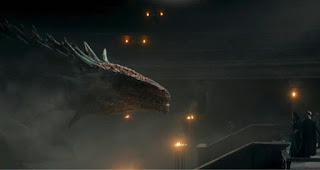Admiral Buenamigo has convinced the Starfleet brass to back his program of uncrewed starships, replacing the entire line of California-class ships. But Captain Freeman convinces everyone to agree to one last race between the Cerritos and an uncrewed Texas-class ship, to see which ship can really do the job best. When a deception is exposed, the Cerritos is soon put in grave danger -- and only Mariner can rally help to save them.
Setting aside the painfully unfunny Peanut Hamper episode this season (which for me will always be an "asterisk" in Lower Decks), this may have been the "least comedic" episode of Lower Decks ever. A handful of jokes were sprinkled throughout -- Ransom teaching Riker's technique for sitting in a chair, Shaxs finally living his dream to eject a warp core -- but for the most part, this was just a straight-up, action-packed, season-culminating thrill ride.
I didn't mind that one bit. Lower Decks really earned an episode like this by actually setting all this up over the course of the season. This finale paid off every major character arc we've seen -- Mariner realized how much she really cared about Starfleet and the Cerritos in particular; Boimler's newfound boldness allowed him to stand up for Shaxs; the secret of Rutherford's memory loss was revealed; Tendi had to face the possibility that her career track would be derailed; Freeman had to confront and apologize for her behavior.
And of course, as usual, the series was building on the Star Trek franchise overall at the same time. The "evil admiral" trope has been around for ages, and Lower Decks gleefully used it (and called attention to the fact). Images of Starfleet Command were recreated straight from past episodes and films, and the show's own three-season long canon of California-class starships came back (and was built up a ton!). Indeed, this episode seemed so epic and definitive that I have to wonder: did they not know, when they were writing it, whether they'd have a season four or not? (Fortunately, they do.)
There was even a small dash of Star Trek social commentary in there. The debate between crewed and uncrewed space flight isn't an issue that most people care deeply about, but it's a pretty hot button topic among those who follow space exploration more closely. And casting that debate as "California vs. Texas" gave it a wry connection to current U.S. politics.
I'd give "The Stars at Night" a B+. It was a solid end to an even more solid season. Had Strange New Worlds not come around, I'd have no problem anointing Lower Decks the best of the modern Trek series. The fact that we have two Trek shows on now that are consistently great (and multiple others that at least bring us great moments) makes this the best time ever to be a Star Trek fan.
















